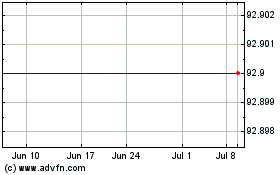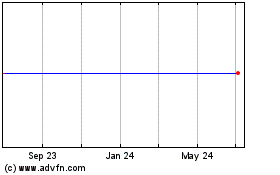(FROM THE WALL STREET JOURNAL 2/5/16)
By Brian Spegele in Beijing and Wayne Ma in Hong Kong
BEIJING -- As he spends tens of billions of dollars to buy
European businesses, the chairman of China National Chemical Corp.
likes to set himself apart from other chiefs of state-owned Chinese
companies, saying he is more interested in performance than
politics.
In meetings with reporters and business associates, Ren Jianxin
often recalls his entrepreneurial roots: taking a $3,600 loan to
found an industrial-cleaning company that grew into a chemicals
empire that the government then took over and made him head. "We're
100%-owned by the government," he told journalists last March, "but
our path of development has been different."
Just how different Mr. Ren's company is from China's other
hulking state-owned enterprises is likely to be an important
question for regulators in Europe and the U.S. as they consider his
latest bid: a $43 billion offer for Swiss seed giant Syngenta AG.
In addition to antitrust reviews, the deal is also subject to
scrutiny by the Committee on Foreign Investment in the U.S., or
CFIUS, which screens deals for national-security concerns.
The 58-year-old Mr. Ren -- who raised cattle and sheep and
tended to wheat and corn fields as a teenager during the Cultural
Revolution, but now cuts a determined figure as head of a global
conglomerate -- is positioning himself as China's most ambitious
global deal maker.
Over the past year before the Syngenta offer, his company, known
as ChemChina, agreed to purchase Italian tire maker Pirelli &
C. SpA, joined a consortium to buy German equipment maker
KraussMaffei Group and took a stake in Mercuria Energy Group, a
closely held oil trader.
In pulling off these deals -- and Syngenta would be the largest
foreign acquisition by a Chinese company to date -- Mr. Ren keeps
ChemChina's interests aligned with the government's. He has tapped
into government funds for his acquisition of Pirelli and talked of
playing a role in Beijing's new Silk Road initiative to spread
Chinese investment across Asia and Europe.
Under his leadership, ChemChina has become one of China's
biggest state-owned enterprises, with $45 billion in sales and
140,000 employees. That is nearly three times as many employees as
Dow Chemical Co., where sales last year were slightly higher than
ChemChina's at $49 billion.
Given to wearing black trousers and open-collar shirts instead
of suits, Mr. Ren is driven by a vision that acquisitions can
transform ChemChina, helping it catch up with international rivals
and become a creator of leading-edge chemical products, according
to people familiar with him.
"He's quite different from other executives at state-owned
enterprises who define themselves first as government officials,"
said Pang Guanglian, deputy secretary general of the China
Petroleum and Chemical Industry Federation. "He is more of an
entrepreneur."
Mr. Ren was ahead of the curve in China in tapping foreign
investment and management expertise. In 2007 he sold a 20% stake in
a unit of ChemChina to a U.S. private-equity firm, the Blackstone
Group. Two Blackstone executives joined the unit's board and
assisted the company with financial and strategic planning. Earlier
this year, ChemChina hired a former Bayer executive to run the
ChemChina unit, China National BlueStar, a rare foreign head for a
state-owned company.
Mr. Pang, who has attended meetings with Mr. Ren, said targeting
mature companies with experienced managers is a way to enhance
ChemChina's brand and expand its sales channels. Mr. Ren's offer
for Syngenta keeps the company in Switzerland and its management
intact.
Tyler Rooker, assistant professor of Chinese business at the
University of Nottingham, said Mr. Ren runs his overseas businesses
through monitoring and budgeting rather than through interference.
"They're willing to keep the management on," said Mr. Rooker, who
has studied the overseas acquisitions of Chinese state companies.
"This is very patient capital."
Mr. Ren was Communist Youth League secretary at a state
chemicals research institute in his hometown, the western city of
Lanzhou, before taking a 10,000 yuan loan -- about $3,600 at the
official exchange rate back then -- to launch an
industrial-cleaning company in 1984. In an interview with the
McKinsey Quarterly in 2008, he said he got the idea after learning
that eight million tons of coal a year were being wasted by dirty
boilers and he had read about an acidic cleaning agent while at the
institute.
In the 1990s, he began a spree of acquisitions to expand
BlueStar. He eventually relocated its headquarters to Beijing,
where in 2004 his company was absorbed by ChemChina as part of a
government-initiated restructuring of China's chemicals industry.
Leaders installed him as ChemChina's president.
At ChemChina's headquarters, Mr. Ren frequently eats lunch with
employees at the company cafeteria. Inside is a branch of his Malan
Noodle Fast Food Chain Store Co., which makes noodles in the style
of Mr. Ren's hometown.
In the McKinsey interview, Mr. Ren said he created the chain in
a bid to "create jobs for the unfortunate."
Mr. Ren has said he is aware of the risk of opposition in Europe
to large-scale Chinese investment.
At a packed news conference Wednesday at Syngenta's headquarters
in Basel, Switzerland, Mr. Ren played to his audience. He said he
loves Switzerland and saw it as "symbol of peace and quality
products."
---
Lilian Lin in Beijing and John Revill in Basel, Switzerland,
contributed to this article.
(END) Dow Jones Newswires
February 05, 2016 02:47 ET (07:47 GMT)
Copyright (c) 2016 Dow Jones & Company, Inc.
Syngenta (NYSE:SYT)
Historical Stock Chart
From Mar 2024 to Apr 2024

Syngenta (NYSE:SYT)
Historical Stock Chart
From Apr 2023 to Apr 2024
